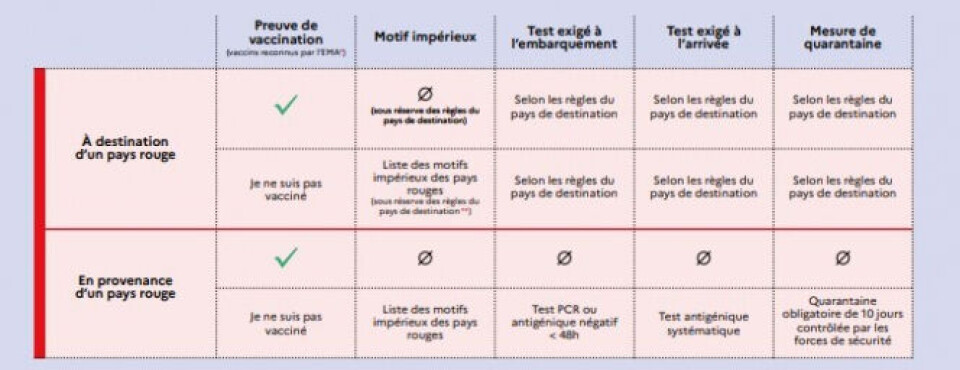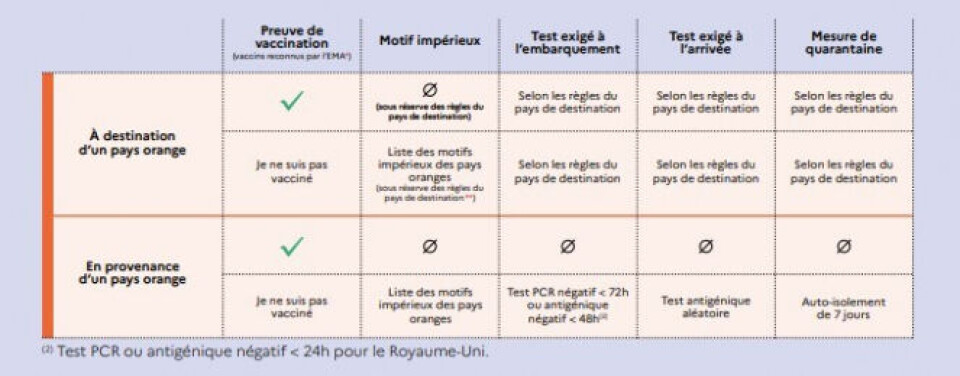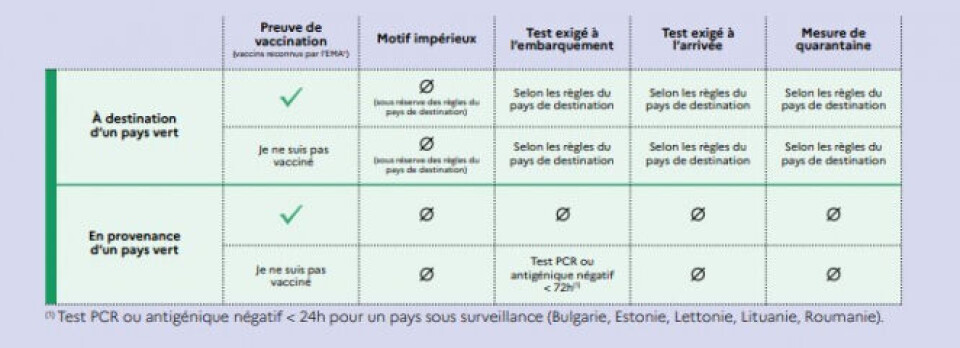-
Why your car insurance in France is expected to increase this year
Premiums are forecast to rise by four to six percent in 2026
-
Two Britons killed in avalanche in French Alps were with an instructor
French skier also died in the disaster at Val d’Isère on Friday February 13
-
British Airways launches bargain £2 flights to France (but there’s a catch)
The flights are only available to members of the airline’s Avios scheme who are redeeming loyalty points
Recap: France’s current traffic light travel restrictions explained
We look at which countries are on France’s red, amber and green lists, and the rules that travellers to and arrivals from these destinations must follow

France’s traffic light travel rule system imposes different restrictions on travellers leaving and arriving in the country, depending on their destination or country of origin. We explain how the rules work.
The latest update to France’s travel rule traffic lights sees Moldova, Montenegro and Serbia added to the red list.
This means that currently (as of November 2) the red list includes: Afghanistan, Brazil, Costa Rica, Cuba, Georgia, Moldova, Montenegro, Pakistan, Russia, Serbia, Suriname and Turkey.
Iran was downgraded to the amber list, into which Singapore and Brunei had also been upgraded from green.
Saudi Arabia, Argentina, Australia, Bahrain, Canada, Chile, South Korea, the UAE, Hong Kong, Japan, Jordan, Kuwait, Lebanon, New Zealand, Qatar, Rwanda, Senegal, Taiwan, the Comoros, Uruguay and Vanuatu remain on the green list.
The green list also includes the 27 EU member states, as well as Andorra, Iceland, Liechtenstein, Monaco, Norway, San Marino, Switzerland and the Vatican City.
Every other country in the world is under amber-level restrictions.
How does France’s travel list work?
Since its launch on June 9, France’s traffic light system has categorised countries based on their Covid infection rates and the presence of different variants within their territory.
In countries classed as green there is no “active circulation” of the virus and no record of “any variant of concern.”
Countries come under the amber list if there is “an active circulation of the virus” but infection rates remain “under control,” and there are no variants of concern present.
Red list destinations are countries or territories where “an active circulation of the virus is observed, with the presence of variants of concern.”
Different restrictions on arrivals in and departures from France apply depending on the list in question.
Travellers will also need to consult the rules in place in the country they are travelling to or from, where they may be required to comply with further measures.
What does a red list designation mean?

The restrictions on travel to and from red list countries depend on whether the traveller is vaccinated or not.
Leaving France
Fully vaccinated people are exempt from all restrictions as long as they can prove their vaccination status. A person is only classed as being vaccinated seven days after their second dose or 28 days after their first in the case of the single-dose Janssen jab.
Children travelling with fully vaccinated adults are classed as vaccinated when leaving France.
Unvaccinated people wishing to leave France must provide an essential reason for travel, a list of which can be found on the French Interior Ministry website. The traveller’s purpose of travel should be detailed in an Attestation de sortie du territoire métropolitain (Certificate to leave metropolitan France), also found on the link above.
People travelling to red list countries should determine whether they will be subject to additional restrictions on their arrival.
Arriving in France
Vaccinated people do not need to comply with any Covid-related measures when entering the country, other than presenting proof of vaccination and an Engagement sur l’honneur (sworn statement) confirming that they are not experiencing any Covid symptoms and have not recently been in contact with a confirmed case.
Unvaccinated people must present an essential reason detailed in an Attestation de déplacement vers la France métropolitaine (Travel certificate to metropolitan France).
These travellers must also:
- Take a PCR or antigen test in the 48 hours before they begin their journey. Children under 12 do not have to take a test
- Self-isolate for ten days on arrival and complete a form detailing their quarantine address so that the authorities can confirm their compliance
- Depending on their country of origin, some travellers must also take a test on their arrival in France, to which they must consent through a form found on the Interior Ministry website
- Complete a sworn statement (as above)
What does an amber list designation mean?

Leaving France
Fully vaccinated people are exempt from all restrictions as long as they can prove their vaccination status.
Unvaccinated people wishing to leave France must provide an essential reason for travel, a list of which can be found on the French Interior Ministry website. The traveller’s purpose of travel should be detailed in an Attestation de sortie du territoire métropolitain (Certificate to leave metropolitan France), also found on the link above.
Arriving in France
Vaccinated people are not subject to any restrictions when entering France.
Unvaccinated people must present a negative PCR test taken in the 72 hours prior to departure or an antigen test taken in the 48 hours prior to departure.
Those travelling from the UK must take this test in the 24 hours before their journey begins.
Children under 12 are exempt from testing requirements.
Depending on your country of origin, you may be subject to screening on arrival for which you are asked, in order to facilitate administrative procedures, to complete a form.
You will also need to present:
- A sworn statement certifying the absence of Covid symptoms and of any contact with a confirmed case of Covid
- A sworn agreeing to take an antigen test or biological examination on arrival in metropolitan France if asked to take one
- A sworn undertaking to self-isolate for seven days, and another sworn undertaking to take a biological virological screening test (PCR) at the end of the isolation period.
These documents are all available on the Interior Ministry website.
What does a green list designation mean?

People travelling to and from a green list country do not need to present essential reasons for travel, regardless of their vaccination status.
When arriving in France, vaccinated people must be able to prove their vaccination status and complete a sworn statement attesting to the absence of Covid symptoms.
Unvaccinated people must also present this sworn statement and a negative PCR or antigen test taken within the last 72 hours.
For unvaccinated travellers from Bulgaria, Estonia, Latvia, Lithuania and Romania, this test should be taken in the 24 hours before their journey begins.
The restrictions imposed on travellers from abroad are available to view on the French Interior Ministry website.
Related articles
Do I need a Covid health control form to drive from France to Spain?
Covid: What rules for travelling from France to Spain and Italy?
Eight updates for air, ferry and rail travel to and from France
























